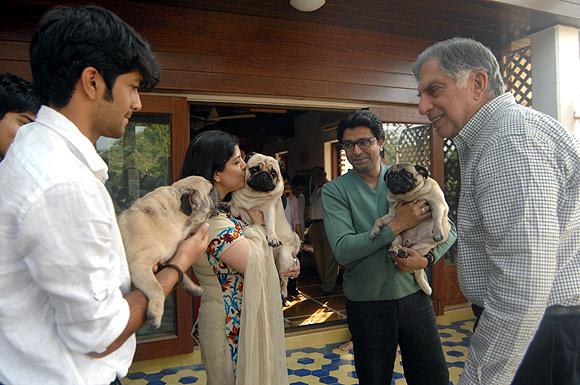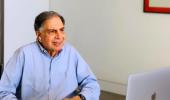'He was a practical person who ensured that he thought about the common man, animals, the fact that they have a life and they have to be respected.'

"He was one of the nicest bosses to have," muses Jehangir HC Jehangir.
Jehangir, the chief executive officer of the 350-bed, 79-year-old Jehangir Hospital, Pune, begun by his grandparents, serves on the board of Tata Trusts (Sir Ratan Tata Trust) since 2019 and was part of the board when Ratan Tata headed it as the chairman.
But their association goes back far many more years to even more exhilarating, stimulating, times.
In the mid-1970s, when a young, enthusiastic Tata, in his early thirties, was industriously occupied with turning around National Radio and Electronics (Nelco), that manufactured radios and their components, Jehangir was his youthful executive assistant.
Jehangir remembers his highly instructive EA days under Tata, from where his admiration for RNT began, in an interview to Vaihayasi Pande Daniel/Rediff.com.
"Everyone knows his business achievements of going from a few billion to a several billion dollar empire, when he stepped down, and obviously his head was well above the clouds, perhaps in the stratosphere, but the feet never left the ground," recalls Jehangir.
How did you get to know Mr Ratan Tata? When did you first meet him?
Well, to start with, the families go back many generations. So, in the context of that, when he was a young, young, man, and I was a much, much younger person, at that point, in one of the trust meetings -- where my family and tje Tatas were together for a particular trust -- I met him.
Then several years later, I ended up working in a company that he was running, which is Nelco. And then I became his executive assistant for two years and (I spent) quite a lot of time with him.
That's when the real one-to-one relationship was built.
What was it like being his executive assistant?
He was one of the nicest bosses to have. And I'm not saying this because of the family connection.
It was everyone's view -- one of the nicest people to work with. And naturally, someone from whom one learned a hell of a lot at that time, even though it was 40 odd years ago, which one carries (with one's self) throughout one's life.
What kind of things did you learn from him?
The number one thing is values.
One doesn't need to learn that, one already had family values and integrity. But (one learned) the sheer importance of it in business, where integrity and values come before profit. If you don't make a profit, it's okay, as long as you don't compromise values and integrity.
He must have been rather young at the time, but he was already that kind of person when he was very young and you worked under him? I understand his grandmother had a lot of influence, so he was very concerned with doing the right thing by the Tata name. Did that come across to you too?
Absolutely.
Not just by the Tata name, but by his own name, by his own nature, his own culture, which very much was the Tata culture.
He didn't do it because he had to. He did it because it came to him naturally.

He was known to be a soft-spoken person.
Yes, very soft spoken, very self-effacing, never really liked to be in the limelight. I'm talking about at that time.
Obviously, later on in his career, whether he liked it or not, he had to be. But very soft spoken, very gentle.
His admonitions were something to learn about. If he had to admonish someone, he would do it in the gentlest of ways, but get the point across. Without hurting anyone or having a temper tantrum or humiliating anyone. He would admonish someone in a way which was more corrective than anything else, and the person, without fail, would take it in the same spirit and correct what needed to be corrected.
You were his executive assistant for two years. Any incident or memory that you have from that time?
Well, there are plenty, but they are all along these lines -- where he was self-effacing, he was a team player, he saw the importance of others.
He was not an 'I' man at all. 'I' never figured in his conversations or vocabulary. It was always 'we' and it was always that kind of teamwork.
We honoured him in our hospital in Pune by putting up a large hoarding. I haven't even seen it because I've been in Bombay, and that just has a line which says: If you want to walk fast, you walk alone, but if you want to walk far, you walk together.
That was who he really was?
Whether that was a quote or not, that was something that embodied his entire spirit.
After that two-year stint you didn't have a direct connection with him?
After that, I had to move out and be in our own family eco-system. I did have a connect for several years, we would meet socially and regularly. Then, of course, when he got busier, and busier as chairman, that became less and less and less.
And except for messages of congratulations when he achieved something, which was quite regular. Then after he retired and started spending a lot of time with the Trust, that's when he reconnected and he asked me to join the Ratan Tata Trust, which I deemed it an honour to do.
What year did he ask you to come on the board of the Tata Trust?
He spoke to me in 2018, and the appointment happened in 2019.
Is it a five-year term?
In a charity trust, generally, there are no terms.
You've been on the board since 2019 and you're still serving on the board?
Absolutely, yes.
When you interacted with him at the Tata Trust, it must have been quite different from all those years ago because this was seeing him in quite a different role?
The content of the interactions was different -- that was a commercial company (Nelco) and this was a trust -- but the spirit was absolutely the same...the spirit, the values and the integrity were absolutely the same, without the slightest change.
Many years had gone by then... Had he changed?
The point is that, as you would imagine, as the executive head of the Tata group, the call on his time was huge, with all these companies in his portfolio. And therefore, there wasn't too much time that he could spend on the Tata Trust, as much as he wanted to do that. But even during that time, he did some restructuring in the Tata Trust.
But when he stepped down from executive responsibilities in the business, he spent all his time in the Tata Trusts, and that was really what was the difference.
It was just an ability to spend the time on several passions that he wanted to use to benefit society, by and large.
How often would you meet him? For what lengths of time?
Well, we would meet in meetings, that would happen every now and then. And then, whenever necessary, I would either meet him separately or we'd talk on the phone or even message.
All those serving on the Tata Trust were aware that his health was declining and it would not have come as a surprise?
His health was getting frail.
But till his time in the hospital -- when he became serious, which, fortunately, was only a couple of days -- till that time, his mind was absolutely razor sharp, and that's what matters most.
When was the last time you met him? I'm sure that that last meeting must be etched on your mind.
Yes. The last time I met him was in a Tata Trust meeting in August, and we were to meet in Pune just a few days later. He said that we'd be meeting in Pune, but for various reasons, that trip got cancelled.
So, therefore, the last time I met him was as we came out of the August Tata Trust meeting, which always happened at the World Trade Centre (south Mumbai).

You knew each other for so many years. What were some of the interests you shared? Or, even commonalities, though he was much more senior to you.
One of the things, interestingly, we shared was automobiles, engineering and technology, and in that area. That was a common interest. But he had many other (interests) other than that. Aviation was a very passionate interest. As you know or may not know, he was a very accomplished flyer in his time.
He even learned to fly helicopters.
He had this great opportunity and invitation, which no one really gets -- I can't think of any single private person getting an invitation to fly an F-16 fighter jet, which he did in a show in Bangalore many, many, years ago.
I mean, no one but no one, no civilian ever gets an invitation to do that. But the US Air Force, when they were here for an air show, invited him to fly an F-16, which is a state-of-the-art fighter jet.
Was he, by nature, an emotional person? Religious? Spiritual or philosophical? Did any of these would fit the bill?
No, he didn't wear his emotions on his sleeve.
He was not religious or spiritual in the orthodox way of ritualistic or whatever. But his spirit was so clear in terms of what he did. Only a person of a certain character would, without exceptions, always do the right thing, whether it was profitable or not, whether it was beneficial to him or not, whether it was good for his image or not. Regardless of all this, he would always strive to do the right thing.
Whether you are religious in the sense of being ritualistic, or not, is of no meaning or importance, if you are not able to carry out what he did in his life (without being religious in the ritualistic sense).
He was a practical person who ensured that he thought about the common man, animals, the fact that they have a life and they have to be respected.
And his cancer initiatives go right down to the common man and all of that. So, it was more practical than philosophical. It saw results on the ground.
In this time that you served with him on the board, are there any anecdotes or special memories?
No, I can't think of anything, because everything is a special memory.

What did you actually witness about his relationship with dogs?
In the early days at his home his dogs would be very much a part of the dinner party and all of that.
And it's not just a passion for dogs as a dog lover or having pets, he set up a phenomenal veterinary hospital, state of the art.
Not just pedigree dogs, but the stray dogs on the road were cared for and loved by him. Bombay House, when it was completely redone, had a kennel, especially for these dogs, where they were cared for. I can't think of any corporate headquarters in the whole world where something like this would be done.
He always cared for dogs whenever he saw them wherever he saw them.
 IMAGE: Jehangir HC Jehangir. Photograph: Kind courtesy Jehangir HC Jehangir/linkedin.com
IMAGE: Jehangir HC Jehangir. Photograph: Kind courtesy Jehangir HC Jehangir/linkedin.comSince you serve on the Tata Trust board, what is the future going to be like? What is Mr Noel Tata like?
He is a very wonderful person. The future is very secure.
Is he very similar to his brother in certain ways?
Well, everyone is an individual, but as far as all the values and all that is concerned, we are very happy to see that continuity.
Is there anything else you would like to add about Mr Ratan Tata? Something that people don't know?
Everyone knows his business achievements of going from a few billion to a several billion dollar empire, when he stepped down, and obviously his head was well above the clouds, perhaps in the stratosphere, but the feet never left the ground.
His death is a loss for every one of us. And, well, I go back many, many years, so it is a loss.
Feature Presentation: Ashish Narsale/Rediff.com











 © 2025
© 2025